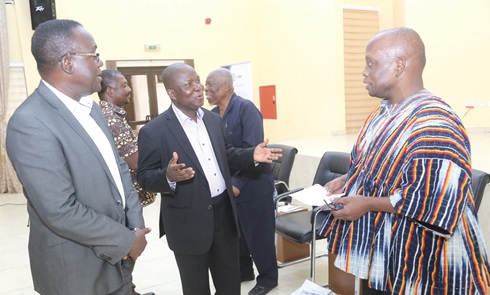
Ghana loses revenue due to flawed hybrid system — CNREM Director
The Director of the Centre for National Resources and Environmental Management (CNREM), Solomon Kwawukume, has called for the implementation of mineral production sharing agreements (MPSA) to help optimise benefits from the extractive industry.
He explained that the hybrid system outlined in the Petroleum (Exploration and Production) Act, 2016 (Act 919) was becoming detrimental to the country, as the current fiscal regimes governing the extractive industries were plagued by three significant challenges, resulting in revenue losses.
He mentioned the challenges as inflated capital costs of transfer pricing, over bloated operation and administrative expenses and underpricing through selling to affiliated companies below the prevailing market prices.
Addressing participants in a seminar on Ghana’s extractive industry in Accra, Mr Kwawukume said the flaws in the system were reducing taxable profits and tax payable to the host country.
“The Ghana hybrid system that is currently governing and regulating the two groups of extractive industries is fraught with three major challenges, denying Ghana the revenue that is due it,” he said.
Sector’s classification
Mr Kwawukume said the country’s extractive industry could be classified into two major sectors that were subsoil minerals and hydrocarbon sub-sector. He said under the subsoil minerals were gold, diamond, manganese and bauxite which commercial production started over 100 years ago under the British colonial administration.
He said until now mining of those resources was under the royalty/corporate taxes fiscal regime, despite a complete paradigm shift to the Mineral Production Sharing Agreement (MPSA), in progressive developing countries.
“For instance, Eritrea takes 40 per cent of total output of all mineral produced in that country, without investing a cent in the project. If Eritrea can adopt MPSA, which would give them more of their resources, why can't Ghana do the same?
“In Ghana, royalty is as low as three to five on mine head prices determined by the mining companies themselves which the country has no control over,” he said. He said the Bank of Ghana asserted some three years ago that Ghana earned just between 2.5 per cent to three per cent of total market value of gold exported from the country, apart from the billions of dollars smuggled out of the country every year.
Complete sellout
The director stated that the lithium agreement was a complete sellout for pittance and not in the best interest of the country, as compared to how other jurisdictions were handling their lithium discoveries.
He said Uganda and Bostwana were good examples to learn from on the continent of Africa regarding how they were handling their natural resources. The Director of the EfD Ghana, Prof. Wisdom Akpalu, stated that leadership over the years had not managed the country’s natural resources properly.
He called for a national consultation among all stakeholders that could ensure the development of the right laws and their successful implementation to maximise the benefit of the extractive industry.
Work together
A Director at the Department of Economics at the University of Ghana (UG), Prof. Daniel Twerefou, underlined the need for experts and industry actors to proffer solutions that could address challenges in the extractive sector.
